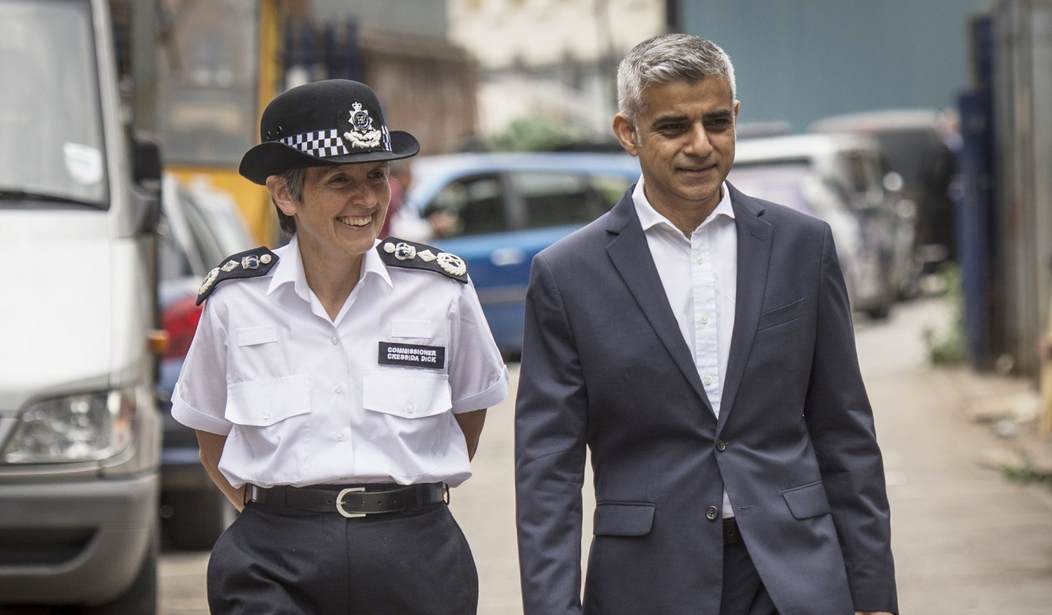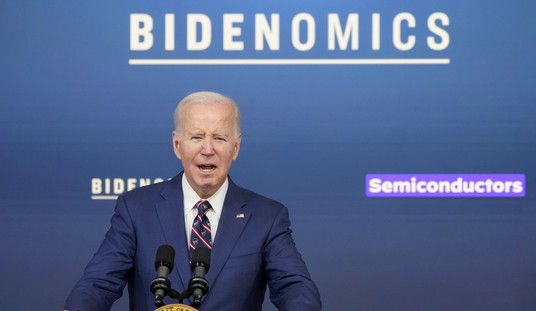What more do you need to know about the difference between Eastern and Western Europe in 2018? When Donald Trump visited Poland last July, he was greeted with wall-to-wall cheers, a sea of American flags, and enthusiastic chants of “Trump! Trump! Trump!” When he goes to Britain on Thursday, he’ll supposedly be welcomed by massive protests and “a giant ‘Trump Baby’ balloon” floating in the skies over central London — a puerile insult for which Sadiq Khan, that city’s Trump-hating mayor, has approved a permit (even as his police force has refused to allow a pro-Trump rally during the presidential visit). This in a country where Members of Parliament from all parties, it will be remembered, argued after his election victory for him to be banned from the UK.
In a June 29 piece for PJ Media, I asked: “What’s Wrong with Britain?” These days, when it comes to appeasing Islam, hating Trump, and shutting down freedom, the UK seems determined to outdo every other country in Europe. Yes, there are exceptions. PJ Media reported the other day that for the duration of the visit, the Jameson Pub in London will rename itself the Trump Pub to show the president that he has “a big fan club in London.” Well, that’s one pub out of about 3,600. Similarly, the rock star Morrissey has spoken up for Tommy Robinson and given a thumbs-up to Anne Marie Waters’ For Britain Party. Terrific — but how many other British celebrities agree?
We’re constantly reminded that London isn’t the UK, any more than Hollywood is America. Katie Hopkins insists that once you get out of London, ordinary Brits are just like red-state Americans, rejecting the capital’s insidious leftism, EU fandom, Trump-bashing, and Islam-love. It was these regular folks, we’re reminded, who voted for Brexit. Well, okay. Then again, take note that Sadiq Khan isn’t Britain’s only Muslim mayor. Of England’s 300-odd mayors, about thirty, or ten percent, are Muslim — this in a country that’s about four percent Muslim. The other day, one of those mayors, Sheffield’s 28-year-old Somali-born Magid Magid, actually banned Trump from his city (not that Trump had planned to go there anyway, but still).
Recall, too, that all those grooming-gang scandals — in which local authorities were revealed to have spent years, even decades, covering up the fact that packs of young Muslims were making sex slaves out of thousands of pre-teen non-Muslim girls — occurred in localities like Rotherham, Rochdale, Peterborough, Newcastle, Oxford, Bristol, and Telford. A relative of mine who lives in one of those leafy rural counties of southern England that have remained relatively untouched by the Islamic invasion — and that still bear something of a resemblance to the Agatha Christie-like settings of Midsomer Murders (where homicide is a quaint matter involving vicars, tea shops, and local cricket matches, not fanatical fathers and mothers committing honor killings) — despises Trump and cherishes England’s multiculturalism.
In my June 29 piece, I cited a recent Spectator column that discussed the Muslim aversion to friendship with infidels — an aversion dictated by the Koran — from a point of view that struck me as breathtakingly clueless. The same magazine’s July 7 issue contains an even more mind-bending article that dismissed concerns about the erosion of free speech in Britain and elsewhere in the West as so much “horses***.” This, at a time when Tommy Robinson, the nation’s most prominent critic of Islam, is sitting in prison on a charge that is, excuse the expression, “horses***.”
I was delighted to learn this weekend that Daniel Pipes’ Philadelphia-based Middle East Forum (MEF) is organizing and funding the next big London protest against Robinson’s incarceration (it’s on July 14), and is also paying for his legal defense and “bringing foreign pressure on the UK government to ensure Mr. Robinson’s safety and eventual release.” That’s great news — but why did an American non-profit have to take the lead in this matter? MEF (which also footed the bills for the June 9 protest) underscores that it’s working with “a coalition of UK advocacy groups” — but it sure sounds as if, to a considerable extent, Americans are stepping in to do a job that no major British human-rights or free-speech organization with deep pockets wants to be associated with.
On July 4, I wrote about Darkest Hour, the Churchill movie, which I had just gotten around to seeing. It’s stirring and all that, in just the ways you would expect. But the more I think about that film and the history it recounts, and compare what happened then to what’s happening now, the more I find myself wondering if we’ve been sold a bill of goods all along about the Battle of Britain. You know the story, of course: on June 18, 1940, two days after the fall of France, Churchill gave a speech in the House of Commons in which he called on his fellow British subjects to “brace ourselves to our duties, and so bear ourselves, that if the British Empire and its Commonwealth last for a thousand years, men will still say, ‘This was their finest hour.’” Years later, when Churchill came to write his six-volume history of the war, the second volume, covering May to December of 1940, was indeed called Their Finest Hour.
But was it — dare I ask — really their finest hour? Were the overwhelming majority of Brits really determined, as Churchill put it in another speech twelve days earlier, to “fight on the beaches … fight on the landing grounds … fight in the fields and in the streets … fight in the hills” — determined, that is, to fend off the Nazis to the very death rather than broker a deal or sue for peace or (if the Nazis really did manage to land an army on the British coast) flee to Canada or some outpost of Empire? Or was this fight-to-the-last-man business, at least to a greater degree than we realize, a romantic conceit concocted by Churchill? After all, nobody was polling the people of Britain in June of 1940 to ask them how far they were willing to go in sacrificing themselves for their country. During the Blitz, were they all really as courageous as Churchill later suggested? Or were they just, being British, uncommonly phlegmatic?
There’s no way to know. But one thing we do know is that as soon as the war was over, the voters of Britain, having defeated National Socialism, gave Churchill the bum’s rush and installed a socialist government of their own. While the vanquished West Germans rose out of the rubble and built a thriving new capitalist economy almost overnight, the victorious British cocooned themselves in a nanny state, delaying their recovery by years. Taxes went up, industries were nationalized. The council flat system was expanded, making the government the landlord of a huge percentage of the population. Previously, the English had been a proud people — proud of English liberty and Magna Carta, proud of their Navy and Empire, proud of their Anglican Church, proud of their magnificent victories over Napoleon and the Kaiser, proud of their rich language and sublime literature. Over the decades that followed, however, tens of millions of them would be brainwashed by their leaders, teachers, and the BBC into worshiping, instead, government bureaucracy, the welfare state, and the National Health Service.
To be sure, Britain also had, after 1950, a increasingly dynamic business and financial sector that made it a top world economy. And when all the socialism started to have the deleterious effect that too much socialism always ends up having, the British turned to Thatcher, who pulled them back from the brink. Then along came Tony Blair with “New Labour,” which went easy on the socialism but doubled down on the sociocultural revolution, introducing the suicidal immigration policies that have transformed the face of England. And since then, both parties have basically followed the same path, pursued the same policies, and repeated the same insipid slogans about the glories of diversity, all the while bowing and scraping to totalitarian Islam. And most of the nation’s populace — the descendants of the men and women who, confronted with an earlier form of totalitarianism, are said to have chosen possible obliteration over submission — have gone along with it all.
Elsewhere in Europe, there are promising signs of resistance to the madness of Islamization. In the Netherlands, a new generation of politicians who share Geert Wilders’ alarm about Islam are on the rise. After Giuseppi Conte became Italy’s prime minister last month, he called a halt to illegal immigration. The Sweden Democrats are soaring in the opinion polls. Leaders of Poland, Hungary, and other Eastern European countries have boldly defied EU demands that they take in so-called refugees from the Muslim world. It’s looking more and more as if Angela Merkel’s days are numbered, along with her reckless immigration and security policies. And in France, Macron isn’t looking so good either.
As for Britain — yes, it has Tommy Robinson, and Anne Marie Waters, and that Lord Pearson fellow, who in June made simple factual statements about Islam in the House of Lords only to be answered by cries of “shame!” and “nonsense!” and a threat of expulsion. It has all those ordinary citizens who’ve taken to the London streets to support Robinson. And of course just over half of its electorate voted for Brexit, which puts the UK ahead of every other EU country on that score, anyhow. But it’s also got a prime minister who’s so feckless about pulling off Brexit, let alone doing anything else constructive, that her cabinet members are quitting in disgust. It has those thirty or so Muslim mayors — but does it have thirty equally high-ranking political officials who are willing to speak the truth about Islam as bluntly as Robinson and Waters? If not, why not? Can it be that what can seem the maddeningly passive response to Islamization by all too many Brits is, in fact, psychologically of a piece with Londoners’ stoicism during the Blitz? How to discern, after all, whether a stiff upper lip signifies defiance or passivity?









Join the conversation as a VIP Member